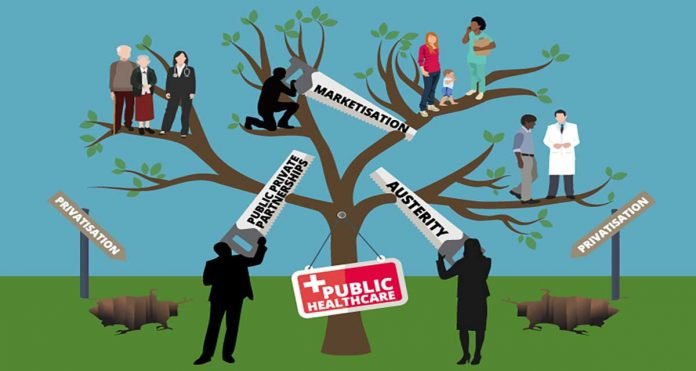The marketisation of healthcare.
Healthcare is a national competence, not the remit of the EU. Right? Yes and No. Rulings from the European Court of Justice, and the European Commission’s policies of recent years, mean that “Services delivered by national health systems are, as a rule, now considered as an economic activity”.1 For a long time, member states argued healthcare is not an economic activity, as most providers do not intend to make a profit.2 But its treatment as one means EU rules on the internal market (free movement of goods, persons, capital and services), public procurement and state aid, in principle apply to healthcare services. The Commission’s 2011 directive on cross-border health care, partially based on internal market rules promised to expand the choice of patients in Europe.3 More fundamentally, it answers the question of whether healthcare should be publicly planned or subject to market forces. It also opens the door to countries’ exporting their healthcare problems, e.g. richer member states sending patients to poorer ones where treatments are cheaper, potentially depriving locals of medical resources that instead go to well-paying foreign patients – a problematic kind of ‘medical tourism’. There is also an inbuilt inequality around whose choices are increased: patients likely to leave their country for treatment will mainly be those able and accustomed to travel or live abroad, in other words those with higher incomes. Whilst “the choices of those who are not mobile, for language and cultural reasons, and who are dependent on neighbourhood support, may actually shrink as a result of local services becoming increasingly under-funded” ie those on lower incomes.
Brexit, Trade and the NHS
Public campaigns spread across the UK concerned that TTIP could open up public services like the NHS to competition from multinational companies, resulting in “a wave of privatisations.”66 Legal advice prepared for trade union Unite concluded TTIP posed “a real and serious risk” to future UK government decision making on the NHS.67 But UK officials insisted TTIP was no threat to the NHS, nor any other trade and investment deal, which “cannot force the UK to privatise public services”. Suggestions to the contrary, they said, are “irresponsible and false”. Yet they refused to back this up with evidence, denying access to their own legal advice on TTIP’s potential impacts. And the risks for the NHS are real: procurement rules that force it to contract out services, ‘investor protection’ a barrier to rolling back privatisations, and more. Brexit and Trump may have shifted the debate away from TTIP, but the threat to the NHS from such trade deals is no less real. The UK government was always a vocal supporter of TTIP (in its most extreme form), refusing to exempt the NHS, and routinely promoted corporate interests in EU trade policy. This doesn’t bode well for future trade deals it will seek with the US and other countries. Nor does a 2017 government advisory committee report on the revolving door, which found “plenty of scope” for “patient safety regulators to move to companies in the health sector”.68 Brexit is no protection from the interests driving NHS privatisation.
3. A shared ideology: PPPs and public spending cuts
There is a shared ideological underpinning of (much of) the European Commission and the corporate lobbies it has a close relationship with: business knows and does best. In the context of the Commission’s promotion of public private partnerships in healthcare, and its use of economic governance to cut public expenditure on health, the Commission’s actions appear to be less a result of corporate lobbying than a consequence of this shared ideology.
Read more:
This is a "Pay as You Feel" website Please help keep us Ad Free.
You can have access to all of our online work for free. However if you want to support what we do, you could make a small donation to help us keep writing. The choice is entirely yours.






















